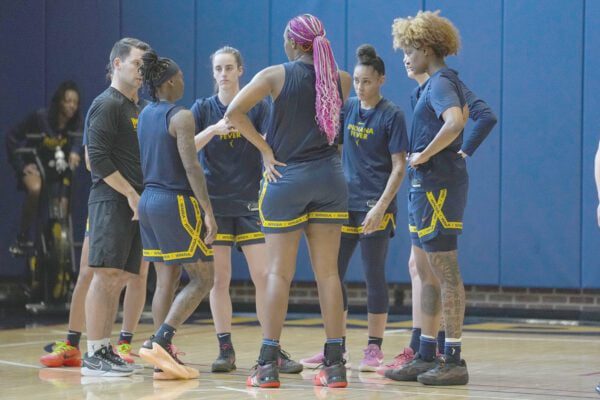Indiana has been basketball-obsessed for over a century — home to packed high school gyms, legendary college programs and passionate professional fans.
But behind the scenes of the Indiana Fever’s rise, something sacred is unfolding: game day chapels may be the quiet difference-maker.
“We’re trying to help create the three-dimensional athlete,” said Fleceia Comeaux, coordinator of Chaplains Serving the Indiana Fever. “The players take care of the physical, and they usually try to take care of the mental. But the spirit is often neglected. That’s where we come in.”
Beyond the stat sheets and star power, a different kind of preparation is taking place.
“We want to help them tap into their spiritual side,” Comeaux said. “When an athlete says, ‘I can do all things through Christ who strengthens me,’ that’s more than words. That scripture speaks to the mind and tells the body what to do. … As chaplains, we literally walk into the space where they work and bring God with us. We attach the Word of God to the very thing they do on the court.”
A calling, not a title
Chaplain Wynesia Jackson shares that her passion is helping people grow in their relationship with God. That calling grounds the work of the Fever chaplaincy team, now entering its 26th season. The chaplains approach their roles not as honorary titles — but as a ministry of presence.
“First, we pray. This is a unique space, so it takes a unique person,” Comeaux said. “The needs of players — and staff — are different from any other environment. We need people who are sensitive, discerning and wise. And we pray for all three before we invite anyone to join us.”
The path to becoming a WNBA chaplain is far from casual. After the discernment process, candidates go through interviews, then engage in monthly league-wide meetings, retreats and ongoing training. Most are already active leaders in their local churches before they step onto the professional stage.
“I really believe that your spiritual life is a competitive edge.”
~ Fleceia Comeaux
“This isn’t about titles or clout,” Comeaux said. “It’s about service. We want to out-serve everyone here. We’re not fans — well, we are — but that’s not why we’re here. I really believe that your spiritual life is a competitive edge. What if every team tapped into that?”

The power of being poured into
Chaplain Reggen Melson remembers having access to organizations like Athletes in Action and Fellowship of Christian Athletes in college — but never anything like game day chapel.
“I can only imagine what it would’ve been like to have that before a game — someone pouring into me, asking, ‘How is God going to use you today?’” she said. “That kind of reminder would’ve been powerful. Now, I get to be part of that for someone else. It’s a blessing.”
For athletes playing at the highest level — often under intense pressure and public scrutiny — chapel is a space of grounding. It’s a place where they’re reminded that their value doesn’t begin or end with a scoreboard.
Comeaux puts it this way: “When you know who you are, you can play free.”
Faith. Identity. Purpose.
Game day chapels connect faith, identity and purpose. They offer more than a moment of prayer — they serve as a sacred huddle where athletes align with their calling and ground their gifts in something eternal.
In a state where basketball is religion, what happens before tipoff — in quiet rooms with open hearts — may be just as powerful as what happens under the lights.
For more chaplain information or to donate, visit www.chaplainsforw.com.
LaTASHA BOYD JONES
Tasha Jones is a poet, writer, researcher, and educator whose work explores language as a tool for liberation and resistance. She hosts In the Beginning: The Spoken Word Podcast, the #1 spoken word podcast on Apple and Spotify. Tasha is also the Poems & Parables Literary Journal editor and is currently writing Pyramids. Plantations. Projects. Penitentiaries. You can follow her on social media: @iamtashajones, @itbspokenwordpod, and @poemsandparables.







